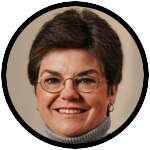
Effie Caldarola
In Omaha, Nebraska, where I live, we have a feature writer in the local paper who covers the stories of refugees in our city. Her most recent article featured the trials of a family from Congo who spent years in a Tanzanian refugee camp hoping for a better life.
After extreme vetting, they were accepted to live in Omaha. But resettlement wasn’t done well by their agency. Orientation was limited. After a year in the country, a visitor found a family member pounding on a can because no one had introduced them to a can opener. Sometimes, a flush toilet is mystifying to a refugee.
With my Sunday morning coffee, I saw the headline: “Fragile System of Survival.” I began to read, but then set the article aside for later. Sometimes, it’s too painful to digest the news before breakfast.
So, I began to get ready for my day. My bathroom is large and comfortable. Big mirror; two double sinks. Nothing opulent, but roomy with the usual “stuff” we often take for granted: silk flowers, plenty of clean towels, a bag of makeup, all the cleaning supplies I need, a toilet I know how to operate.
[hotblock]
Suddenly, thinking of those refugees, I looked at myself in the mirror and asked, “Why are you so lucky?”
And just as suddenly, the face that looked back at me was the face of my great-grandfather. I have a huge portrait of him that’s been bequeathed to me by family members who had no place to put it. I’ve always identified with him, his short, stocky frame, his dark West of Ireland eyes, the way he lifts his left eyebrow in the picture just like I do.
My great-grandfather, appearing in my mirror, answered my question. I’m lucky because in the mid-19th century, he had the courage to get on a famine boat after his parents succumbed to hunger, according to family oral history. He had the physical strength and perhaps good luck to survive the “coffin ships” that left many dead.
He had the drive, energy and intelligence, despite being illiterate and filthy when he arrived, to claim Nebraska farmland and make a success of it in a bewildering and hostile climate far from Ireland’s green and gentler climes.
My great-grandfather buried more children than he raised. He overcame a political climate that denigrated the Irish whose country had become unlivable and wretched. According to an old hired hand who knew him, whom I interviewed when I was young, he could nevertheless spin cheerful yarns as he bellied up to the bar in the tiny town near his farm.
He helped build a church with other Irish settlers, and transplanted trees from the Platte River banks to frame the church grounds. He saw three children, including my grandfather, reach success in adulthood, and his portrait indicates a prosperous man.
Lately, we’ve been subjected to startling and hate-filled language emanating from the highest level of our government. We’ve heard certain countries, mostly with brown and black residents, disparaged. It’s suggested we need immigrants who are well-educated and white, not the huddled masses of yore.
The statistics tell us that immigrants and refugees produce more than we give them. They strive and succeed; they pay taxes and become citizens. Along with the descendants of enslaved peoples and Native Americans, they are the bedrock of our nation.
We who are so lucky owe a debt. Thank you, great-grandfather, Thomas Costello. May we whose ancestors persevered through unthinkable trials do our best to welcome those who struggle now.
PREVIOUS: How can the church support young people during the ‘defining decade’?
NEXT: ‘Dreamers’ reveal nightmare of broken immigration system



Share this story